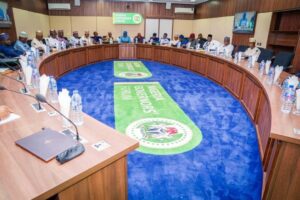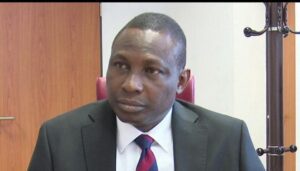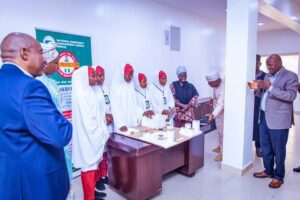
Why military involved in internal security operations – CDS
The Chief of Defence Staff (CDS), Gen. Lucky Irabor, says the involvement of the Armed Forces of Nigeria in internal security operations is sacrosanct with the history of formation of the nation’s military.
Irabor said this while delivering a lecture to participants of the National Defence College (NDC) Course 31, on Thursday in Abuja.
The lecture is titled, “the Military and National Security in Contemporary Security Environment in Nigeria: The Armed Forces of Nigeria in Perspective“.
He said that the role of elementary internal security had expanded in many countries plagued by serious internal security threats such as insurgency, terrorism, subversive activities and disaster.
He said that the need for the military to assist in restoring normalcy became necessary, particularly where the police were overwhelmed or incapable of dealing with such threats.
According to him, the pursuit of national security by nations now includes consideration for a wide range of factors, including the social, political and economic dimensions.
Irabor said the involvement of the nation’s military in internal security operations was borne out of necessity, adding it should not be seen as incursion into the political landscape of the country.
He said the operations were conducted in aid to civil authority, adding that they were defined by excellent legal and policy instruments such as the constitution of the Federal Republic, the National Defense Policy, and the National Security Strategy.
“This makes it imperative for nations to assess the threats and develop a stable concept of national security based on their national interests, core values, objectives and the need to preserve their territorial integrity.
“A nation that indeed only mobilize its human and material resources in pursuit of national objectives in a secured and conducive environment.
“In the case of Nigeria, the armed forces of Nigeria, alongside other security agencies provide a conducive environment that is required for national growth and prosperity.
“The armed forces has been conducting internal security operations since its establishment and I believe that our friends from outside of Nigeria may need to actually read our history to know the basis of our establishment.
The CDS said there had been a rise in the rate of the deployment of the armed forces for internal security operations since the return of democracy in 1999 owing to rising security threats.
He said that the military had played a vital role, not only in keeping with its constitutional mandates, but also in supporting the Nigeria police whenever the need arises.
According to him, the military is currently engaged in a number of operations (kinetic and non-kinetic) across the country in dealing with the myriads of security challenges confronting the nation.
Irabor also identified the issues of ungoverned spaces in the neighbouring Chad and Niger Republic, unmanned borders and politicization of security issues as major challenges in the fight against insecurity.
According to him, there are about 264 approved international borders points in Nigeria, 361 points are in the North East and North West regions but only 124 points are manned.
“The unmanned points are used by non-state actors to move freely from other countries to Nigeria.
“Politicisation of insecurity by unpatriotic citizen and politicians for personal interest undermines national security,’’ he said.
The CDS urged participants to put their skills and aptitude together to find solutions to the nation’s security challenges.
The Commandant of NDC, Rear Adm. Murtala Bashir, said the lecture was part of the college’s course modules on national security and to tap from the wealth of experience of the defence chief.
Bashir said the lecture had exposed issues that could help participants to develop strategies that would help in tackling the security challenges.
He thanks the CDS for the in-depth lecture and urged participants to take advantage of the module to enrich their knowledge.



